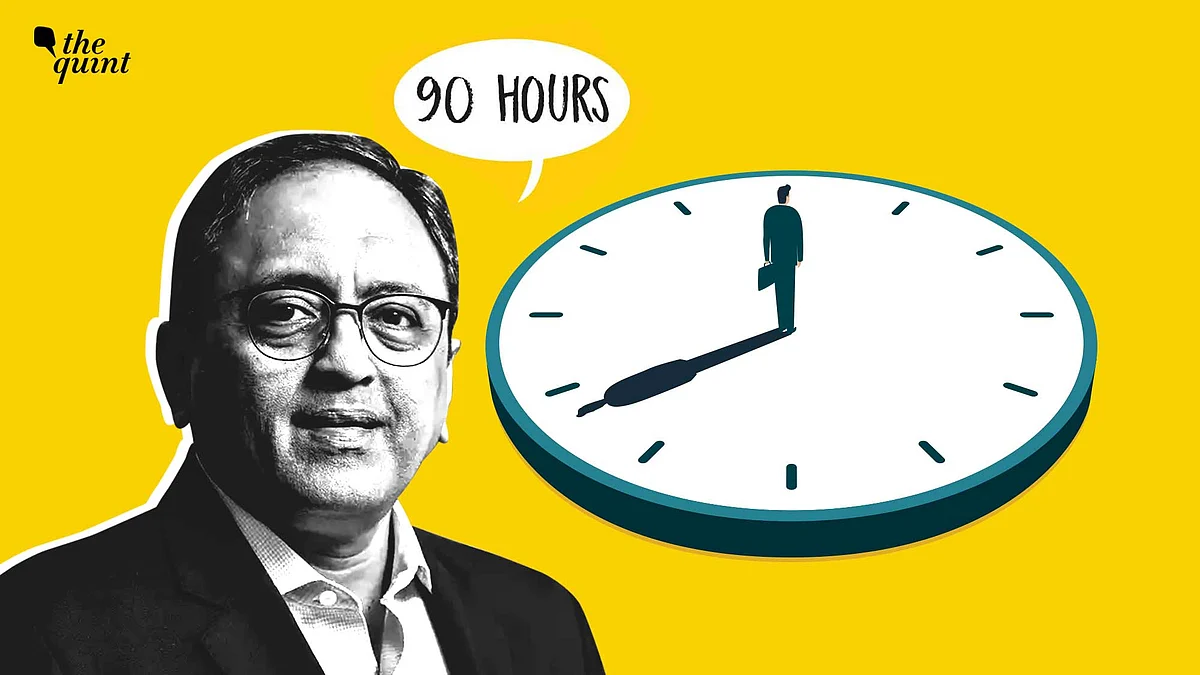
90-Hour Work Week: Corporate Leaders Must Realise the World Has Changed
If Mr Subrahmanyan deems a 90-hour week is what L&T needs, then he must sell his dream, writes Prabal Basu Roy.

advertisement
L&T Chairman SN Subrahmanyan’s comment about a 90-hour work week has evoked widespread criticism, memes, and jokes on X, with even a politician writing into the Labour Ministry to investigate potential violation of labour laws with respect to working hours. That the criticism has been so wide – former CEOs, noted industrialists, a famous Bollywood actress, and ordinary professionals – does tell us something about leadership, tact, and diplomacy in public life.
It is perfectly legitimate for a leader to dream differently and share that dream with his team. But it is a wholly different matter when remarks such as 'staring at your wife and wives staring at their husbands' are used, implying condescension and patronising at the very least.
In all fairness, it might have been his idea of a joke, but that is not necessarily shared by most. Transcending on personal time, and implying that all hobbies which one may pursue, or chores that are necessary, or indeed simply lazing away under the sun is detrimental to nation-building or achieving company objectives is where it hurts – especially if it seemed to be decreed by the chairman in a tone which was fairly sarcastic of the low-lifers who need to be told what to do with their personal time.
The company and its HR have complicated matters by a couple of ham-handed media releases which sing praises of Mr Subrahmanyan’s abilities, leadership style, and L&T’s role in nation-building – all completely unnecessary and irrelevant to the discussion.
Work-Life Balance
The other aspect of this episode is the obvious work-life balance equation many have spoken about.
Without repeating them, I would like to add that the most productive nations have a five-day week of 40 hours – and some even lower.
The top 10 nations with the highest productivity globally include Switzerland, Ireland, Sweden, Netherlands and Germany – and all these countries work a maximum of 40 hours a week. It is true that employment levels are very high in these countries and lower employment countries like India, Nigeria, Brazil, Indonesia, and Kenya will, by definition, automatically have a lower productivity, but that can only be improved by infusion of capital, technology, education and skill development, and an innovative work environment, not by shifting the goal post for the relatively few who work diligently from 40 hours a week to 70 hours as per Mr Narayana Murthy or 90 hours by the L&T chairman!
Large conglomerates with access to the government must influence them to prioritise these public initiatives. Simultaneously, such conglomerates themselves must invest their considerable surpluses in skill development and education like the pioneering work by Mr Azim Premji’s foundation.
Productivity Vs Hours Spent in Workplace
The third aspect of this controversy is that for a senior leader like Mr Subrahmanyan to have ignored the non-linear relationship between productivity and hours spent in the workplace. Work output studies globally have demonstrated that productivity per hour decreases as hours worked increase beyond an optimal point due to obvious factors like fatigue, stress, and declining focus, which, in turn, lead to depression, higher hospitalisation, and poor personal relationships.
Of course, being from the high-tech industry, I fully realise that creative or knowledge-based tasks require rest and mental alertness which make extended working hours counterproductive. This may not be the case in repetitive task-based jobs in traditional industries which accommodate some extra hours. It is for reasons like this that the most productive companies in the world are Apple, Google and Nvidia. No points for guessing how many hours they work!
But, as a respected corporate leader of consequence, he must realise that the world has changed from the days of early 20th century in terms of laws (Universal Declaration of Human Rights defining just and favourable conditions of work, International Labour Organisations' global standards for labour conditions, Fair Labour Standards Act, etc), employee expectations as well as competitive opportunities available.
If he deems a 90-hour week is what L&T needs, then he must sell his dream. If he finds takers, more power to him. Else, discretion perhaps is the better part of valour as the old adage goes. Especially in the world of social media where perception through the battle of narratives is finally what counts.
(This piece has been written by invitation from The Quint. Prabal Basu Roy is a Sloan Fellow from the London Business School. This is an opinion piece and the views expressed above are the author’s own. The Quint neither endorses nor is responsible for the same.)
- Access to all paywalled content on site
- Ad-free experience across The Quint
- Early previews of our Special Projects
Published: undefined